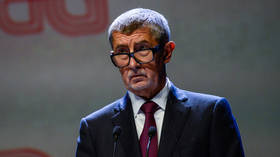
Political opponents of Andrej Babis claim his “pacifism” in regard to the Ukraine conflict endangers the Czech Republic

FILE PHOTO: Former Czech Prime Minister Andrej Babis. © Omar Marques / Getty Images
Former Czech Prime Minister Andrej Babis is becoming a threat to the government in Prague because of his “pacifist” statements about the Ukraine conflict, Foreign Minister Jan Lipavsky has said.
Babis, who served as prime minister between 2017 and 2021, now heads the largest opposition bloc called ANO. Last week, he criticized the government of current PM Petr Fiala for stopping consultations with neighboring Slovakia due to Bratislava’s opposition to arming Ukraine.
“Now he is taking a pacifist note. It seems to me that he is becoming a threat to the security of this country,” Lipavsky said in an interview with the state TV broadcaster, arguing that the former prime minister’s comments undermined Prague in the international arena.
Babis “knows nothing about foreign policy,” Lipavsky added. “He did absolutely crazy things with Czech-Polish relations, he allowed himself to be guided by [Hungarian PM Viktor] Orban in European politics, in an absolutely crazy way.”
Babis rejected accusations of pacifism, noting that it was his government that expelled dozens of Russian diplomats over the 2014 ‘Vrbetice incident’, later ruled to have been an accident.

Read more
Speaking to the outlet iDNES.cz, Babis described Lipavsky as “someone who became a minister by mistake” and “is only capable of talking about Ukraine.”
“I don’t want to talk about him anymore. An eagle does not hunt flies,” the former prime minister added.
Babis has criticized the Czech government for “totally destroying” relations with Slovakia – once part of the same country – over the Ukraine conflict. Fiala has canceled the upcoming joint cabinet meeting because Slovak Prime Minister Robert Fico has made statements about Ukraine judged by Prague to be “pro-Moscow,” while the Slovak foreign minister met with his Russian counterpart, Sergey Lavrov.
Fico was elected last September on a platform advocating for a peaceful resolution of the Ukraine conflict, reversing Bratislava’s previous position of unconditional military support for Kiev.
Russia has repeatedly said that it remains open to meaningful peace negotiations and has blamed the lack of diplomatic breakthroughs on the Ukrainian authorities and their Western backers.
The US and its NATO allies have insisted that the only acceptable basis for peace talks would be Ukrainian President Vladimir Zelensky’s “peace formula.” The proposal calls for the non-negotiable return of all former Ukrainian territories, unconditional withdrawal of all Russian troops, payment of reparations from Moscow and trials of Russian leaders before an international tribunal. Russia has laughed off the idea as ludicrous.




